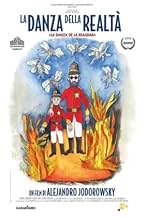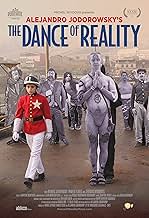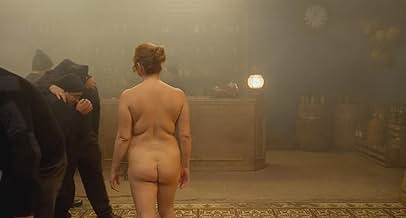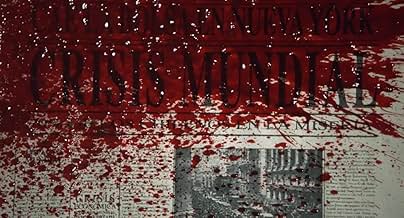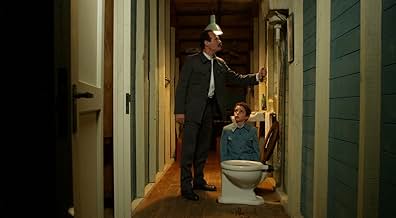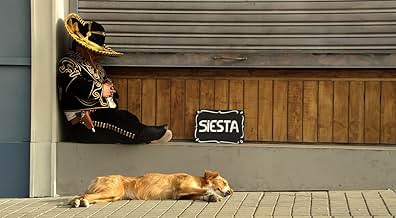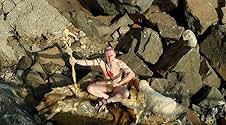En un pueblito chileno, el hijo de una pareja desarraigada, formada por un padre comunista riguroso y una madre cariñosa pero débil, trata de abrirse camino en una sociedad que no comprende ... Leer todoEn un pueblito chileno, el hijo de una pareja desarraigada, formada por un padre comunista riguroso y una madre cariñosa pero débil, trata de abrirse camino en una sociedad que no comprende los orígenes judío-ucranianos de la familia.En un pueblito chileno, el hijo de una pareja desarraigada, formada por un padre comunista riguroso y una madre cariñosa pero débil, trata de abrirse camino en una sociedad que no comprende los orígenes judío-ucranianos de la familia.
- Premios
- 5 premios y 9 nominaciones en total
- Theosophist
- (as Cristobal Jodorowsky)
- Jorobada
- (as Alizarine Ducolomb)
Argumento
¿Sabías que...?
- CuriosidadesThis was Alejandro Jorodowsky's first movie in 23 years.
- Citas
Alejandro as a child: The darkness is swallowing everything. It's going to devour us.
Sara: Alejandrito, do I love you?
Alejandro as a child: Yes, Mama.
Sara: How much?
Alejandro as a child: From the sky to the earth.
Sara: This is not my love, it comes from God. I am merely the sender. As God creates all, so we all radiate His love. My son, the darkness loves you as much as I do, for it is God's shadow.
- ConexionesEdited into Poesía sin fin (2016)
He also always appears in interviews with an infectious, joyful personality even when he talks about very serious things like art and living and good life and being screwed over in the movie industry (see Jodorowsky's Dune for more on that). But here, he gets to return as a filmmaker, after an absence of decades, and the results? An overused word is appropriate here: fantastic.
The Dance of Reality is Jodorowsky's (for him) straight-forward look at what it was like for himself, and his father Jaime, to go through the late 1930's in Chile - but in the only way that Jodorowsky can as one of the last old-school surrealists (by this I mean he could pal around with Salvador Dali like it was nothing). The movie might appear to be two movies: the first half more-so considers how rough things were for poor little 'Alejandrito', especially under rather Jaime Jodorowsky's strict "Be a Man" philosophy of parenting (and, of course, Jodorowsky cast his son, Brontis, to play his father, and the director appears as "himself" in certain parts). The boy has long locks of golden hair, and these get cut off (rather, the wig comes off!) and the boy has to deal with being tickled - "Don't laugh!" - slapped, dentistry without anesthesia, and being picked on by fellow boys for being Jewish.
The movie might appear to be all about the kid from the first half... but then Jodorowsky does something really interesting - though it's bound to split audiences - as he really follows the father in the second half (with a couple of trips back to the son, and the mother Sara who sings every one of her lines of dialog). It's both the son AND the father's story in Dance of Reality, and it's touching how the director charts what is kind of a tale of humbling for this father character as he tries, as the staunch anti-dictator Stalin-supporting Communist he is, to kill the ruler of Chile Ibanez, and fails, and goes through many trials and tribulations.
Often, we see, with his hands curled in a permanent state of vegetation! Dance of Reality is filled with heart and passion, and what's great about it is how much the director doesn't cheat any of the emotions. Another filmmaker, maybe one more self-conscious or ironic, might play for a wink some of these scenes where the mother talk-sings in her operatic tones and the father beats the boy or the town-folk go about in their crazy ways (sometimes with masks, sometimes it's amputees up in arms, pun intended), or the clowns or lepers or other freaks who the director loves to see on screen.
Jodorowsky doesn't play like that; for him, this is all magical realism, surrealism, any-kind-of-WTF-ism you want, but it's not something that is taken precisely as a goof, if that makes sense. Yet it's that which makes many scenes delirious, and deliriously funny. The cure for leprosy, for example, is a howler of a scene, even (or because) as it doesn't make logical sense.
Sense? Hey, it's this filmmaker, why not go along for the ride? And it's actually more straightforward and stream-lined than the acid-trip fever dreams of his early/notorious midnight movie work. Here, it's more reflective - it's hard not to compare of course to it's cousin, Fellini's Amarcord, also in the 1930's, about fascism, and big breasts. But I'll continue returning to this film if only for its love of filmmaking, of bringing great big colors on the screen - I don't know how the color timing worked or how much was used, but every color here is vibrant and alive, as if the director were still remembering this like it was today, and it feels that way - and how much the family unit it explored without full-on cynicism. You can look at this father-mother-son and they have their problems and issues (putting it lightly), but... they're real and painful and experience pain and the horrors of society, and persevere.
This is a powerful work of brazen, uncompromising, funny-sad-strange-illuminating art for those open to the experience.
- Quinoa1984
- 22 nov 2014
- Enlace permanente
Selecciones populares
- How long is The Dance of Reality?Con tecnología de Alexa
Detalles
- Fecha de lanzamiento
- Países de origen
- Sitios oficiales
- Idioma
- Títulos en diferentes países
- The Dance of Reality
- Localizaciones del rodaje
- Empresas productoras
- Ver más compañías en los créditos en IMDbPro
Taquilla
- Presupuesto
- 3.000.000 US$ (estimación)
- Recaudación en Estados Unidos y Canadá
- 293.680 US$
- Fin de semana de estreno en EE. UU. y Canadá
- 24.768 US$
- 25 may 2014
- Recaudación en todo el mundo
- 558.636 US$
- Duración2 horas 13 minutos
- Color
- Mezcla de sonido
- Relación de aspecto
- 1.85 : 1
Contribuir a esta página


![Ver Tráiler [OV]](https://m.media-amazon.com/images/M/MV5BYTE4NDM1YWItYTRmNi00OGQyLWJhZTYtYTY5OTU5NTJlOGY4XkEyXkFqcGdeQXRyYW5zY29kZS13b3JrZmxvdw@@._V1_QL75_UX500_CR0)


